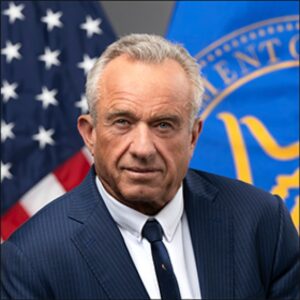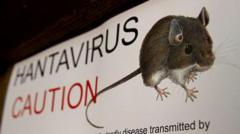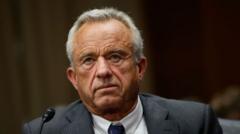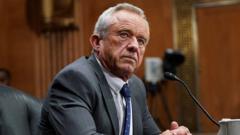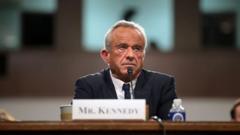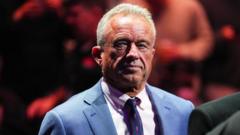Public health officials question the qualifications and motivations of the newly appointed members of the Advisory Committee on Immunization Practices.
**Controversial Shift: RFK Jr's Vaccine Advisory Panel Under Scrutiny**

**Controversial Shift: RFK Jr's Vaccine Advisory Panel Under Scrutiny**
Health Secretary Robert F. Kennedy Jr's new vaccine advisory group faces pushback as it reviews established childhood immunizations.
In a contentious move, US Health Secretary Robert F. Kennedy Jr. has assembled a new panel of vaccine advisors who are set to review established immunization schedules for children and teenagers, casting a spotlight on their qualifications. The Advisory Committee on Immunization Practices (ACIP) held its inaugural meeting Wednesday, weeks after Kennedy replaced the previous 17 members with a group that includes several vocal vaccine skeptics.
Public health officials and politicians have expressed considerable concern over the new appointees, many of whom have histories of questioning vaccine efficacy. The meeting commenced with Dr. Martin Kulldorff, now the panel chair, asserting that he lost his position as a professor at Harvard University due to his refusal to receive the COVID-19 vaccine. Under his leadership, the panel aims to scrutinize child vaccination schedules and examine vaccines that were licensed seven or more years ago, sparking fears about the integrity of these vaccines' approval processes.
Experts like Bill Hanage, a professor at Harvard’s TH Chan School of Public Health, view the initiative with skepticism, arguing that reviewing well-established vaccines, such as the hepatitis B vaccine given to newborns, undermines public trust in proven safety measures. The panel was initially set to cast votes on recommendations for an RSV vaccine targeting infants but postponed these discussions.
The agenda includes a troubling presentation on thimerosal, a mercury-based preservative discontinued in most vaccines, led by Lyn Redwood, a figure from the anti-vaccine movement who has been recently contracted by the CDC to work in its vaccine safety office. This topic has been met with confusion by scientists like Dr. Hanage, who highlight that prior ACIP panels comprised experts who rigorously evaluated vaccine recommendations.
Former ACIP member Dr. Paul Offit criticized the selection of committee members, suggesting they reflect a mindset akin to Kennedy's own views, which often challenge vaccine safety. Notably, Dr. Michael Ross, one of the new members, withdrew ahead of a financial holdings review, intensifying scrutiny on the panel's composition.
Critics from various political spectrums, including Republican Senator Bill Cassidy, have questioned the decision to proceed with the panel amid leadership vacancies and the lack of substantial experience in crucial scientific areas among appointees. With significant public health implications at stake, the actions of this panel will be closely monitored as they navigate the sensitive terrain of childhood vaccinations.
Public health officials and politicians have expressed considerable concern over the new appointees, many of whom have histories of questioning vaccine efficacy. The meeting commenced with Dr. Martin Kulldorff, now the panel chair, asserting that he lost his position as a professor at Harvard University due to his refusal to receive the COVID-19 vaccine. Under his leadership, the panel aims to scrutinize child vaccination schedules and examine vaccines that were licensed seven or more years ago, sparking fears about the integrity of these vaccines' approval processes.
Experts like Bill Hanage, a professor at Harvard’s TH Chan School of Public Health, view the initiative with skepticism, arguing that reviewing well-established vaccines, such as the hepatitis B vaccine given to newborns, undermines public trust in proven safety measures. The panel was initially set to cast votes on recommendations for an RSV vaccine targeting infants but postponed these discussions.
The agenda includes a troubling presentation on thimerosal, a mercury-based preservative discontinued in most vaccines, led by Lyn Redwood, a figure from the anti-vaccine movement who has been recently contracted by the CDC to work in its vaccine safety office. This topic has been met with confusion by scientists like Dr. Hanage, who highlight that prior ACIP panels comprised experts who rigorously evaluated vaccine recommendations.
Former ACIP member Dr. Paul Offit criticized the selection of committee members, suggesting they reflect a mindset akin to Kennedy's own views, which often challenge vaccine safety. Notably, Dr. Michael Ross, one of the new members, withdrew ahead of a financial holdings review, intensifying scrutiny on the panel's composition.
Critics from various political spectrums, including Republican Senator Bill Cassidy, have questioned the decision to proceed with the panel amid leadership vacancies and the lack of substantial experience in crucial scientific areas among appointees. With significant public health implications at stake, the actions of this panel will be closely monitored as they navigate the sensitive terrain of childhood vaccinations.






